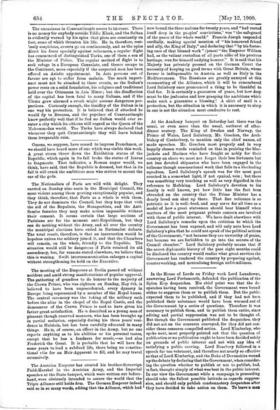At the Academy banquet on Saturday last there was the
usual, or even more than the usual, outburst of after. dinner oratory. The King of Sweden and Norway, the Prince of Wales, Lord Salisbury, Mr. Goschen, the Arch- bishop of Canterbury, to mention only the chief names, all made speeches. Mr. Goschen most properly and in very happily chosen words reminded us that in praising the blue- jackets and Marines who have fought so nobly for their country on shore we must not forget their less fortunate but not less devoted shipmates who have been engaged in the toilsome though unsensational work that falls to a blockading squadron. Lord Salisbury's speech was for the most part couched in a somewhat light, if not cynical, vein ; but there was something very touching as well as very dignified in the reference to Mafeking. Lord Salisbury's devotion to his family is well known, yet how little has the fact been obtruded on the country that the Prime Minister has a dearly loved son shut up there. That fine reticence is as patriotic as it is well - bred, and may serve for all time as a model of how a great statesman should bear himself when matters of the most poignant private concern are involved with those of public interest. We have dealt elsewhere with Lord Salisbury's remarks upon the criticism to which the Government has been exposed, and will only note here Lord Salisbury's plea that he could not speak of the political actions of the Government, " not because they are unworthy of praise, but because we are forbidden to go into the secrets of the Council chamber." Lord Salisbury probably means that if the secret diplomatic history of the past eight months could be disclosed the country would realise what great services the Government has rendered the country by preparing against, counterworking, and neutralising foreign unfriendliness.






































 Previous page
Previous page